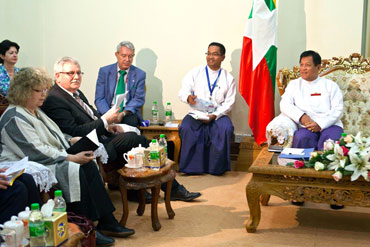Burma’s Election Commission chairman and a small group of political party leaders met last week to discuss a proportional electoral system, a representative from the group told Radio Free Asia last week.
 On the same day, the International Crisis Group, a Brussels-based think tank, said in a new report that proportional representation could help the country avoid conflict with ethnic minorities.
On the same day, the International Crisis Group, a Brussels-based think tank, said in a new report that proportional representation could help the country avoid conflict with ethnic minorities.
Ten leaders of the Democratic and Ethnic Alliance met with EC chairman to Tin Aye to discuss Burma’s current system that favors dominant parties, Thu Wai, the chairman of the Democratic Party, told RFA. On July 18, the group met with President Thein Sein to discuss changes in the electoral system.
The group has proposed that a proportional voting system, which would allow independent and minority parties to win seats in Parliament more easily, replace the current “first-past-the-post” system, under which candidates need only a simple majority to win a constituency, said Thu Wai.
The meeting was called by the Election Commission chairman, who said he would submit the group’s proposal to Parliament to be discussed, said the RFA article.
The Democratic and Ethnic Alliance is composed of the National Democratic Force, the Democracy and Peace Party, the Democratic Party, the Shan Nationalities Democratic Party, the Rakhine Nationalities Development Party, the Chin National Party, Phalon-Sawal Democratic Party, the All Mon Regions Democracy Party, the Union Democracy Party, and the Union and Peace Party.
The meeting came on the same day that a new report on Burma’s political reforms by the International Crisis Group (ICG) was released, saying proportional representation could help Burma remain stable during its political transition toward democracy, particularly by allowing more representation to ethnic minorities.
“Countries in transition often reform their electoral system,” the group said, in the report. “Consideration should be given to the possibility that Myanmar [Burma] would be better served during the transition by a system with greater proportional representation.”
The ICG warned that in the next election in 2015 an overwhelming win by Aung San Suu Kyi’s political party could push ethnic minority parties aside, jeopardizing the cease-fires currently being negotiated with ethnic groups in the country’s border regions.
It noted that in Burma’s post-independence era, there had been considerable dislike among ethnic minorities who said that the plurality voting system favored large Burman parties.


